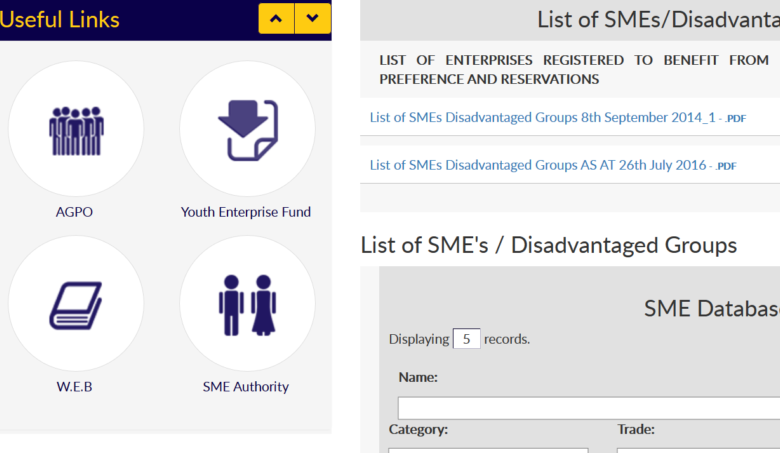Tenders for special Groups

Tendering Rules for Special Groups
Procurement for special groups including youth, women and persons with disabilities. The Public Procurement and Disposal (Preference and Reservations) Regulations 2011 (ext. link) provide a framework that guides this.
These regulations cover groups or regions that have been disadvantaged over time and cannot be able to compete favorably with more established firms and hence must be given preference. The objective of the Regulations is to promote local firms/industries and disadvantaged groups or individuals.
The target groups
- Small enterprises
- Micro enterprises
- Disadvantaged groups
- Citizen contractors
- Local contractors
- Citizen contractors in joint venture with foreign firms
In addition to the Regulations, there are two important circulars issued by the Treasury and and the Public Procurement Oversight Authority respectively. PPOA Circular NO.1 of 2014 (ext. link) gives directions on the implementation of the Procurement Reservation Schemes. Treasury Circular NO.14 of 2013 (ext. link) on the other hand provides directions on the Presidential directive that 30% of all government procurement is allowed to youth, women, and persons with disabilities. Meanwhile, this directive became law. See Sec. 53 (6) of the Public Procurement and Asset Disposal Act.
Other Privileges
The women, youth, persons with disabilities and other disadvantaged groups also do not need to submit the performance securities of ten percent of the contract amount. See Sec. 142 (3) of the Public Procurement and Asset Disposal Act
In procurements reserved for reserved for small and micro-enterprises or enterprises owned by women, youth, persons with disabilities and other disadvantaged groups, a tender security (of up to two percent of the amount) is also not required. Sec. 62 (5) of the Public Procurement and Asset Disposal Act
Reporting Suggestions
This is a critical area for county journalists to focus on. Recent evidence suggests that the 30 percent procurement, preference and reservation policies are a new frontier for procurement corruption. For example, it has been alleged that some well established individuals and firms are sponsoring young people to register firms to win tenders for them. Also, there have been reports of employers listing their youthful employees as directors of companies that they (the employers) remotely direct.
If you want to report on this, find out the directorship of the firms, their sources of funding, previous experiences and any linkages with established firms.
For a simple approach to selecting and contacting firms which are on the list that qualifies for submitting to the special tenders, see our “Find Stories“-page on tenders for disadvantaged.